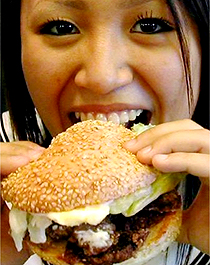Fried whaleburger woos young Japanese customers
Updated: 2006-06-19 15:22
 |
Large Medium Small |

A young Japanese woman bites into a fried whale burger.[Reuters]
The sandwich, which features fried whale meat nestled in a bun with salad greens and lashings of mayonnaise and ketchup-based sauce, is the creation of a small whale restaurant in the town of Wada, about 100 km (62 miles) southeast of Tokyo.
"Young people think whale and bread really go together well, so the burgers are quite popular," said restaurant owner Akiji Ichihara.
For the whaleburger and a whale cutlet sandwich, both of which sell for 300 yen ($2.62), he uses the meat of Baird's Beaked whales taken by Wada-based ships.
The third sandwich option, a whale hot dog priced at 350 yen, is made from minke whale meat taken by the "scientific whaling" programme run by the Japanese government.
Customers gave the sandwiches, which Ichihara serves only one day a month, good reviews. On one record day he sold 700.
"I thought whale meat was too tough to eat, but actually it's tender and very delicious," said Yuko Takahashi, 25, as she bit into a whaleburger.
Juichi Matsunaga, 38, chowed down on a whale cutlet and whale hot dog, which he also pronounced delicious.
The praise is music to the ears of Japanese policymakers, who say that eating whale is a treasured cultural tradition but find demand low among young consumers, many of whom have few chances to try the usually pricey delicacy.
Japan stopped commercial whaling in 1986 in line with an international moratorium but began what it calls "scientific whaling" a year later, arguing that endangered species need protection but others, such as the minke, are numerous enough for limited hunting.
"I think we could whale more, because the number of whales has now increased to the extent that they are damaging the ecosystem by eating too much fish," Matsunaga added.